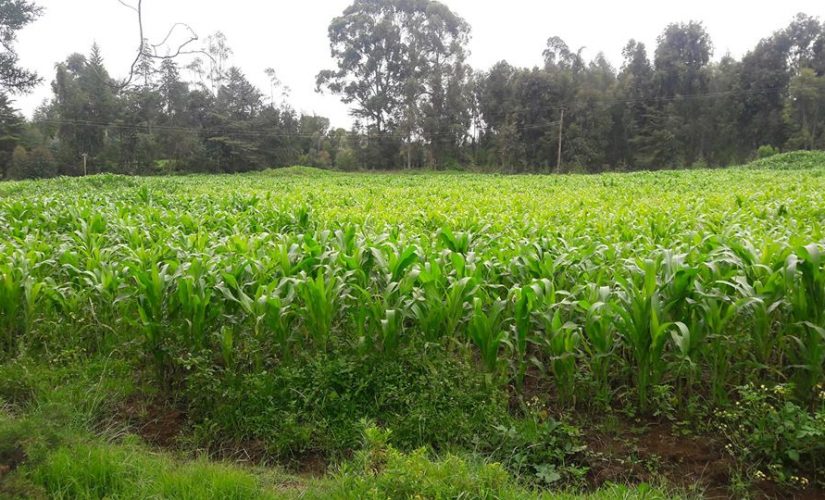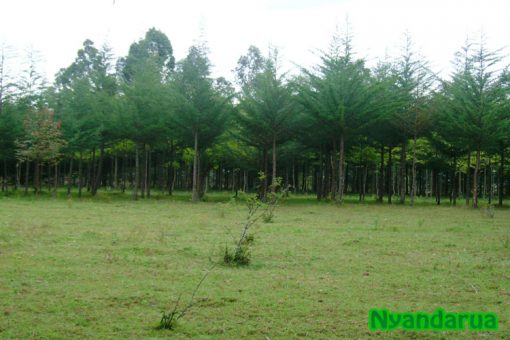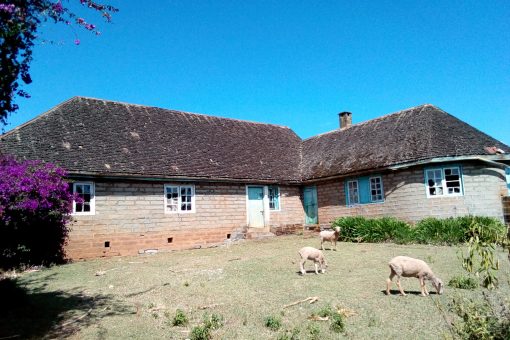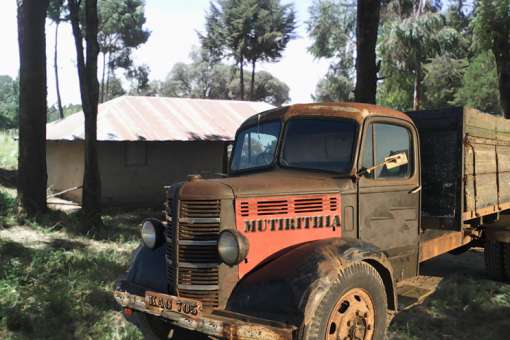I have plenty to say on the subject of farming because as you know by now, I was raised on a farm in Nyandarua and as the saying goes, you can take a girl out of the farm but you cannot take the farm out of the girl. I am also taking into consideration the challenges our young people are faced with today, trying to get white collar employment, in an economy that is not creating many new jobs. Urban migration has been the trend in our country since independence, because that is where the jobs were concentrated, in offices, factories, service industry and in the informal sector. That has since changed and today, those who venture in the urban areas looking for jobs often get disappointed and dejectedly head back upcountry. Like I mentioned in previous posts, I want us to earnestly and purposefully create employment in our rural neighborhoods. Farming is on top of that list because land is the one natural resource that is still widely available in most parts of our upcountry, and even those whose parents don’t own huge chunks of land, there is land available for renting. That cuts out any excuses.
To be able to consider farming as a viable option, first, we need to adjust our focus and attitude towards farming. The image most young people have of farmers is what they saw their grandparents doing year after year, growing the same crops on the same tired, over-cultivated portions of land; then watching them get ripped off by crooked brokers who purchased the produce at a throw away price. The farmers were glad to hand over their produce to those brokers because the only alternative left was to feed the crops to their livestock or worse still, leave the crops in the fields to rot, a very common occurrence in Nyandarua. That is the same Nyandarua farmer I saw growing up and it made farming very unappealing, and understandably so. Now, let us scrap that image from our heads and meet the modern farmer, showcased in some videos I have saved at the end of this blog. Majority of the farmers on those videos are young, educated, confident, highly motivated and almost seem to enjoy farming, for real. Why? Because they are reaping the benefits of their investment in farming. Even the older farmers have moved from “your grandparents” kind of farming to modern farming that is bearing them bumper harvests with ready markets they cannot satisfy the demand. They are not farming because they are out of options but rather because farming is one of the lucrative business options they chose to venture into.
I am so happy with our local TV stations that bring us farming programs featuring farmers in our region and beyond. These programs showcase farmers who are already successful in various fields. And by successful I don’t mean they are all wealthy, large-scale farmers. Far from it. These are farmers, young and old, some on unbelievably small portions of land, some on less than an acre, but they are all conducting modern farming and they are all turning a profit. Some of those farmers quit their formal employment where their salaries were not enough to make ends meet, but modern farming has granted them self employment that is sustaining them and their families better than their corporate jobs ever could. Those farmers detail how they started, how they care for their crops or animals, challenges they face and how they overcome them. They talk about the market for their produce and prices they fetch. These are farmers who are doing “Kilimo Biashara”. You can be one of those farmers in no time, you just need to get inspired and to act. You don’t need a huge capital to start, and if you plant fast maturing crops, in three months you will be taking your first harvest to the market, earning yourself capital for the next crop season, and you will get established as you go along, joining the ranks of those farmers you just watched on video.
In the videos you will meet Catherine Waithera, a very young lady who quit her banking job to do farming. She moved to Murang’a where land for hire was readily available, starting small and she currently rents 21 acres and she plans on expanding. Farming has afforded her a comfortable life including a nice car, a lifestyle her banking job could not afford for her. She expertly explains how she farms her crops and eloquently paints a positive picture for other young people who wishes to venture into farming. You will want to plant yours TODAY after meeting Catherine.
There is Ken Mutethia from Meru who farms Ngwaci among other crops. I know Ngwaci’s are not widely grown in Nyandarua but I was inspired to put his video here for your viewing because Ken is a young man who is a qualified medical doctor who is now a farmer. Yes, that doctor who will examine you when you are sick and write you a prescription, but he chose to become a full time farmer instead. He realized there are no available jobs and even when you get one, it does not pay well, so, he decided to utilize his portion of land gifted to him by his father, and the results speak for themselves. If the cheerful, youthful medical doctor can chose to farm, instead of wallowing in self pity waiting around for non existent jobs, I believe you can positively make a similar choice and turn your life around for good.
You also met Joseph Njihia, the young, well established chicken farmer from Tetu, Nyeri. His extensive knowledge on chicken hatching and rearing, which he explains with great enthusiasm and clarity is absolutely amazing, even I could understand. One look at Njihia, you know he is not your typical farmer: But he is, running his very own successful “Kilimo Biashara” deep in his rural village.
You have also seen Kihara wa Mwangi, the brilliant, yet humble and personable presenter of the program Riri wa Murimi on Mt Kenya TV. Kihara is also an actor and producer, you must have seen him in one of your favorite entertainment shows on TV or on the internet. Yet, Kihara is farming tree tomatoes in Mau Narok where he is from. The video I listed, does not show Kihara as the beloved broadcaster from Mt Kenya TV visiting farmers and interviewing them for our benefit, but rather, simply as Kihara the farmer. He explains step by step how he cares for his tree tomatoes on his one acre farm, and as always, he encourages other young people to venture into farming to reap its untapped benefits. I love his constant clarion call to young people to start farming right where they are, with what they have, even on a 50×100 plot (kieya). His call is rooted in what he witnesses in his line of work, visiting other young people who have beaten the odds to become successful farmers on very small plots of land. If those farmers can do it, you can do it too and change your life for good.
There are other seasoned farmers like Eddie Kamau of Njabini who owns huge nurseries of grafted seedlings of fruits that can grow in Nyandarua and you can see the healthy fruits growing on his farm. We have Ken and Beth Kinuthia growing strawberries in OlJoro Orok, and doing value addition by making their own Homemade Strawberry Jam. There is also Beatrice Mumbi in Kayole, Nyahururu successfully growing strawberries on her very small plot, growing them in bags to reduce water challenges. Other farmers like Kaberi wa Ng’ang’a who grows Leek Onions in Murungaru, Kinangop and Peter Njuguna of Njoro who raises chicken and fish. I like the simple calculation Mr. Njuguna did for Kihara of Mt. Kenya TV. He said a half acre plot can accommodate 11,000 sukuma wiki seedlings. Putting greed aside, if you target to get only Kes.1 from each plant every week, you will have Kes.11,000 in your pocket every week, meaning in a months’ time, you will earn Kes.44,000 easy. That is the bare minimum, but his point was that, you cannot go wrong with farming BUT he cautioned strongly that you have to recognize “times and seasons”. That is the hallmark of Kilimo Biashara. This is where your education puts you ahead in farming. Remember the rule of “supply and demand”? This is it. This is where it applies. It sums up what Mr. Njuguna was saying on “times and seasons”.
As a young farmer, living at home with minimal expenses, working the land yourself with help from your family and friends, you will be better positioned to make good money in one crop season. This will give you the much needed capital to expand your farming, and before you know it, you will be the local employer who hires day laborers to help care for your crops.
You have the internet, a wonderful resource on anything farming related. Instead of watching entertainment videos on your devise like you did over the years with nothing to show for it, use that time to gather information on fast maturing crops that can do well in your area, their care and the market for them. This will help you determine what to grow on your farm. Remember this is not your grandparents kind of farming. This is innovative and targeted farming, trying new crops that nobody knew could grow in Nyandarua, timing the seasons so that you harvest your crops when the markets are experiencing shortages, meaning you will sell your produce at sky high prices putting the much needed cash in your pocket. For Nyandarua, those critical months are January through March. Those are the driest months and almost all families are lacking everyday vegetables like sukuma wiki, spinach, cabbage and even potatoes. All those are fast maturing crops (60 to 90 days) and you can time your harvests to begin in January. This will mean growing your crops in the drought months. Tough, but manageable, if you keep your eye on the prize. If you have no water on your farm to irrigate your crops, make fetching water your single most important daily activity until the rains return. You can use donkey drawn carts to fetch water from your nearest water source, once or twice a day, and your crops will thrive. Always remind yourself that this is your “job” or “business” that you report to every day, attending to its needs and challenges to keep yourself “employed” or “to stay in business” just like the teacher or the shop owner in town. You are all busy working at different fields but you all have a similar goal: to earn a living. You could also build yourself a jua kali greenhouse using recycled plastic bags that farmers usually discard after using the fertilizer that comes in them. With a greenhouse, your crops will not require as much water, even in the hottest of days, saving you time and energy. With good harvests going to a ready and waiting market, you will make good earning which will afford you water tanks to harvest rain water for future irrigation needs. But you have to do the hard work first to establish yourself as a bonafide farmer. You will also need to set aside a research area where you pilot new crops to test them on a small scale before you invest in huge acreage. That is modern farming and you can make a decent living while enjoying the sunshine and open fields of Nyandarua.
If your focus is making a living, you can farm your way into a comfortable life for yourself and your children, just like your grandparents, the Pioneer Parents did from mid 1960s, doing the best way they knew how, rising from nothing to become the Nyandarua landowners we are proud to call our parents. Be the pioneer for your generation. Be the success story that Kihara wa Mwangi, the Shamba boy of Mt. Kenya TV or Kimiti wa Gitau of Inooro TV and others want to visit and tell your inspiring story. I am waiting to see you on TV and I am waiting for your video so that I can feature it here on this blog alongside the ones you are watching today. I want to see my fellow Nyandaruans featuring here in large numbers for my many readers all over Kenya and around the world to know your name and see what you are doing to change your life and the face of our beautiful County. “Nothing is impossible with God” Nituthii i Mugunda Andu Aitu !!!!




